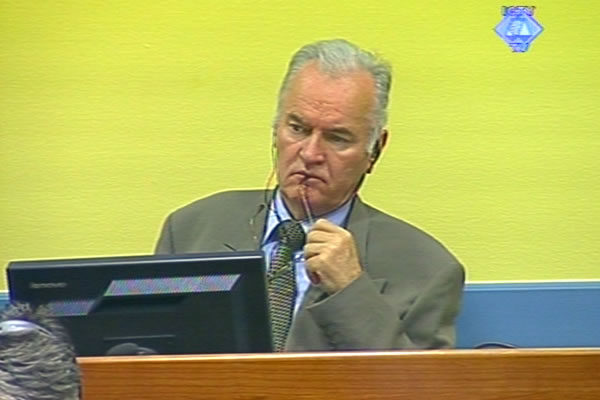Home
'KARADZIC'S GUESTS' IN OMARSKA AND TRNOPOLJE
'I don't want to be neutral facing a prison guard and a prisoner, a detained woman who has been raped seven times in one night and the beast that has raped her', Ed Vulliamy said at the trial of Ratko Mladic. In August 1992, Vulliamy, journalist writing for the London newspaper Guardian, was in the first group of foreign journalists that visited the Omarska and Trnopolje prison camps on Radovan Karadzic's invitation
 Ratko Mladic in the courtroom
Ratko Mladic in the courtroom Ed Vulliamy, journalist writing for the London newspaper Guardian, started his testimony at the trial of Ratko Mladic today. In early August 1992, Vulliamy was in a group of British journalist that visited the Omarska and Trnopolje prison camps in Prijedor area.
In the summer of 1992, the international media published first reports about the prison camps in the territory controlled by the Bosnian Serbs. This prompted Radovan Karadzic to invite British journalists to come and see for themselves that there were no 'concentration camps', no civilians in prison facilities and that the conditions were not as bad as alleged. Vulliamy and an ITN TV crew accepted Karadzic's challenge. Their TV reports and articles about the prison camps in Prijedor caused an avalanche of reactions all over the world, which eventually resulted in the establishment of the Tribunal in May 1993.
Vulliamy has already testified seven times before the Tribunal, five times in cases that dealt entirely or in part to the crimes committed in the Prijedor prison camps. Vulliamy has also testified twice about the HVO crimes during the Croatian-Muslim conflict. Today, at the trial of Ratko Mladic, the transcript of the testimony Vulliamy gave in 2002 at the trial of Milomir Stakic was admitted into evidence. Stakic was the president of the Prijedor municipality and the Crisis Staff; the prison camps in Omarska, Keraterm and Trnopolje were under his control.
In the brief examination-in chief, prosecutor Camille Bibles stressed the role the army played in organizing and implementing the visit of 'Karadzic's party'. The British journalists were flown in to Pale from Belgrade in a helicopter. From there they were driven in military vehicles under military escort to Banja Luka, where VRS major Milutinovic took charge of them. The major accompanied them in a military convoy from Banja Luka to Prijedor. In Prijedor, the journalists were met by all members of the Crisis Staff, including Colonel Arsic. Major Milutinovic then took 'Karadzic's party' to Omarska. Their visit ended when the Prijedor police chief refused to allow the journalists to enter the hangar where the prisoners were held. Major Milutinovic then took the group to Trnopolje.
The prosecution showed several excerpts from the famous TV reports from Omarska and Trnopolje. The footage has been shown numerous times at all trials related to the Prijedor prison camps and the trials of Bosnian Serb political and police officials who were indicted for the persecution of non-Serbs in large areas of Bosnia and Herzegovina.
At the beginning of the cross-examination, Mladic's defense counsel Dragan Ivetic tried to contest Vulliamy's credibility. Ivetic put it to Vulliamy that he betrayed the first tenet of journalism by failing to report 'impartially' from Prijedor in August 1992. The British journalist dismissed the suggestion, saying that he was always 'impartial'' when he reported facts, but that at times he was not 'neutral'. 'I don't want to be neutral facing a prison guard and a prisoner, a detained woman who has been raped seven times in one night and the beast that has raped her', Vulliamy reiterated his opinion on the issue. He had already explained his position in detail last year, when he testified at the trial of Radovan Karadzic.
Ivetic brought up Vulliamy's notes from a meeting with the members of the Prijedor Crisis Staff. At the meeting, Stakic assured the British reporters that there were no concentration camps in his municipality. There were only 'transit centers' where refugees were placed for their own 'protection', Stakic claimed. Vulliamy replied that Stakic said things he wanted the British journalist to believe. However, it was clear that Omarska and Trnopolje were not transit centers, Vulliamy said.
Vulliamy explained why in his article, Shame of the Omarska prison camp, published in August 1992, he had written that 'Trnopolje can't be called a concentration camp': he wanted to be 'rigorously fair' and make a distinction between the Bosnian Serb prison camps and the concentration camps of the World War II. Later, after Vulliamy spoke to the people who had been detained in Trnopolje, he changed his mind, because he realized they had been 'concentrated' in one place and that they were killed and abused, raped and forcibly deported.
Mladic's defense counsel will continue cross-examining Ed Vulliamy tomorrow.
Linked Reports
- Case : Mladic
- 2012-09-06 WITNESS ACCUSES ARMY, DEFENSE BLAMES PARAMILITARIES
- 2012-09-06 PICKAXES, SHOVELS, BLOOD AND TEARS
- 2012-09-05 PEOPLE DIED FOR NO REASON IN BRISEVO
- 2012-09-20 IMPRISONED BY HIS ERSTWHILE NEIGHBORS
- 2012-09-20 MLADIC’S DEFENSE: TRNOPOLJE WAS ‘HUMANITARIAN CENTER’
- 2012-09-21 POLICE RAN PRISON CAMP, ARMY TOOK PEOPLE TO DO FORCED LABOR
